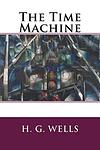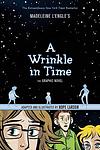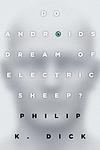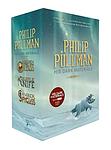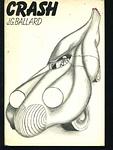The Greatest "Science fiction" Books of All Time
Click to learn how this list is calculated.
This list represents a comprehensive and trusted collection of the greatest books. Developed through a specialized algorithm, it brings together 284 'best of' book lists to form a definitive guide to the world's most acclaimed books. For those interested in how these books are chosen, additional details can be found on the rankings page.
Genres
Science fiction is a genre of literature that explores the potential consequences of scientific and other innovations on society and individuals. It often features futuristic or imaginary settings, advanced technologies, and scientific concepts that are not yet fully understood or realized. Science fiction can encompass a wide range of themes, including space exploration, time travel, artificial intelligence, and alternate realities. It is a genre that allows authors to speculate on the future of humanity and the impact of scientific progress on our lives.
Countries
Date Range
Reading Statistics
Click the button below to see how many of these books you've read!
Download
If you're interested in downloading this list as a CSV file for use in a spreadsheet application, you can easily do so by clicking the button below. Please note that to ensure a manageable file size and faster download, the CSV will include details for only the first 500 books.
Download-
1. Nineteen Eighty Four by George Orwell
Set in a dystopian future, the novel presents a society under the total control of a totalitarian regime, led by the omnipresent Big Brother. The protagonist, a low-ranking member of 'the Party', begins to question the regime and falls in love with a woman, an act of rebellion in a world where independent thought, dissent, and love are prohibited. The novel explores themes of surveillance, censorship, and the manipulation of truth.
-
2. Frankenstein by Mary Shelley
This classic novel tells the story of a young scientist who creates a grotesque but sentient creature in an unorthodox scientific experiment. The scientist, horrified by his creation, abandons it, leading the creature to seek revenge. The novel explores themes of ambition, responsibility, guilt, and the potential consequences of playing God.
-
3. Brave New World by Aldous Huxley
Set in a dystopian future, the novel explores a society where human beings are genetically bred and pharmaceutically conditioned to serve in a ruling order. The society is divided into five castes, each with its specific roles. The narrative follows a savage who rejects the norms of this new world order and struggles to navigate the clash between the values of his upbringing and the reality of this technologically advanced, emotionless society. His resistance prompts a deep examination of the nature of freedom, individuality, and happiness.
-
4. Slaughterhouse-Five by Kurt Vonnegut
The novel follows the life of Billy Pilgrim, a World War II veteran who has become "unstuck in time," experiencing his life events out of order. This includes his experiences as a prisoner of war in Dresden during the Allies' firebombing, his post-war life as a successful optometrist, his abduction by aliens from the planet Tralfamadore, and his eventual death. The book is a critique of war and a demonstration of the destructive nature of time, with a nonlinear narrative that reflects the chaos and unpredictability of life.
-
5. The Hitchhiker's Guide to the Galaxy by Douglas Adams
This comedic science fiction novel follows the intergalactic adventures of an unwitting human, Arthur Dent, who is rescued just before Earth's destruction by his friend Ford Prefect, a researcher for a galactic travel guide. Together, they hitch a ride on a stolen spaceship, encountering a range of bizarre characters, including a depressed robot and a two-headed ex-president of the galaxy. Through a series of satirical and absurd escapades, the book explores themes of existentialism, bureaucracy, and the absurdity of life, all while poking fun at the science fiction genre and offering witty commentary on the human condition.
-
6. A Clockwork Orange by Anthony Burgess
This novel follows the life of a violent young man named Alex, who is part of a youth subculture in a dystopian future England. Alex and his gang engage in a nightmarish spree of rape, assault, and robbery, until he is arrested and subjected to a psychological experiment by the government to "cure" him of his violent tendencies. The novel explores themes of free will, morality, and the nature of evil, while using a unique slang language invented by the author.
-
7. Dune by Frank Herbert
Set in a distant future, the novel follows Paul Atreides, whose family assumes control of the desert planet Arrakis. As the only producer of a highly valuable resource, jurisdiction over Arrakis is contested among competing noble families. After Paul and his family are betrayed, the story explores themes of politics, religion, and man’s relationship to nature, as Paul leads a rebellion to restore his family's reign.
-
8. Fahrenheit 451 by Ray Bradbury
In a dystopian future where books are banned and burned by the government to prevent dissenting ideas, a fireman named Guy Montag, whose job is to burn books, begins to question the society he serves. After a series of events, including meeting a free-thinking teenager and witnessing a woman choosing to die with her books, Montag begins to secretly collect and read books, leading to his eventual rebellion against the oppressive regime. The narrative serves as a critique of censorship, conformity, and the dangers of an illiterate society.
-
9. The Time Machine by H. G. Wells
A Victorian-era scientist invents a machine that allows him to travel through time. He first journeys to the year 802,701 A.D., where he encounters the Eloi, a society of small, elegant, childlike adults who live in harmony but lack curiosity and drive. He later discovers the Morlocks, a nocturnal, subterranean species who prey on the Eloi. After rescuing an Eloi named Weena, the protagonist loses his time machine and must devise a plan to recover it and return to his own time, all while exploring the social and evolutionary implications of the two distinct societies.
-
10. War of the Worlds by H. G. Wells
This classic science fiction novel tells the story of a Martian invasion of Earth, as experienced by an unnamed protagonist and his brother. The Martians, who are technologically far superior to humans, cause widespread devastation with their heat-ray weapons and towering tripods. Despite humanity's best efforts to resist, they seem unstoppable. The novel is a commentary on British imperialism and explores themes of human survival and evolution.
-
11. A Wrinkle In Time by Madeleine L'Engle
The novel follows the story of a young girl named Meg Murry, her younger brother Charles Wallace, and their friend Calvin O'Keefe as they embark on a cosmic journey to rescue Meg and Charles Wallace's father. The father, a scientist, has been missing since he discovered a new planet using the concept of Tesseract, which is a wrinkle in time. Guided by three mysterious celestial beings, the children travel across different dimensions, face evil forces, and learn about the power of love and self-sacrifice.
-
12. The Stand by Stephen King
This post-apocalyptic horror/fantasy novel presents a world devastated by a deadly plague, killing 99% of the population. The survivors, drawn together by dreams of a charismatic and benevolent figure, gather in Boulder, Colorado to form a new society. However, a malevolent figure also emerges, attracting a following of his own and setting the stage for a classic battle between good and evil. The story delves into themes of community, morality, and the capacity for both destruction and regeneration within humanity.
-
13. Neuromancer by William Gibson
In this groundbreaking cyberpunk novel, a washed-up computer hacker is hired by a mysterious employer to pull off the ultimate hack. As he navigates a dystopian future filled with artificial intelligence, corporate espionage, and virtual reality, he must confront his own past and the dark realities of the digital world. The narrative explores themes of technology, identity, and consciousness, pushing the boundaries of science fiction literature.
-
14. Foundation by Isaac Asimov
This science fiction novel centers around Hari Seldon, a mathematician who has developed a branch of mathematics known as psychohistory. With it, he can predict the future on a large scale. Seldon foresees the imminent fall of the Galactic Empire, which encompasses the entire Milky Way, and a dark age lasting 30,000 years before a second great empire arises. To shorten this period of barbarism, he creates two Foundations at opposite ends of the galaxy. The book follows the first few centuries of the Foundation's existence, focusing on the scientists as they develop new technologies and negotiate with neighboring planets.
-
15. Stranger in a Strange Land by Robert A. Heinlein
The novel follows the life of Valentine Michael Smith, a human who was raised on Mars and returns to Earth in early adulthood. Smith struggles to understand human culture, norms, and conventions, while also possessing extraordinary psychic abilities. As he navigates Earth society, he begins to question many of its institutions and values, ultimately creating his own religion to pass on the wisdom he gained on Mars. The book explores themes of freedom, self-reliance, and the nature of humanity, and is considered a classic of science fiction literature.
-
16. Twenty Thousand Leagues Under the Sea by Jules Verne
This classic science fiction novel follows the adventures of Professor Aronnax, his servant Conseil, and harpooner Ned Land as they are captured by the enigmatic Captain Nemo aboard the Nautilus, a technologically advanced submarine. As they journey 20,000 leagues under the sea, they encounter a variety of sea creatures and underwater phenomena. The narrative explores themes of exploration, scientific discovery, and man's relationship with nature.
-
17. Do Androids Dream of Electric Sheep? by Philip K. Dick
Set in a post-apocalyptic world, the novel presents a future where Earth's life has been greatly damaged by a nuclear global war, leaving most species extinct. The remaining human population has been encouraged to emigrate to off-world colonies to preserve the human race. Those who remain on Earth are tasked with maintaining the ecological balance by owning and caring for animals, replacing extinct species with mechanical replicas when necessary. The story revolves around a bounty hunter, who is tasked with "retiring" rogue androids that pose a threat to humans, and his emotional and moral struggles as he goes about his work.
-
18. The Left Hand Of Darkness by Ursula K. Le Guin
The novel is a groundbreaking work of science fiction that explores themes of gender, politics, and identity. Set on a planet called Gethen, where the inhabitants are ambisexual, shifting between male and female, the story follows an envoy from Earth who struggles to understand this alien society. As he navigates the complex political landscape of Gethen, he must also grapple with his own preconceptions about gender and sexuality. The book is a profound exploration of difference, otherness, and what it means to be human.
-
19. His Dark Materials by Philip Pullman
"His Dark Materials" is a fantasy trilogy that follows the journey of a young girl named Lyra Belacqua and her daemon, Pantalaimon, across parallel universes. Throughout their adventures, they encounter a variety of mythical creatures, confront religious and political systems, and grapple with complex themes such as free will, original sin, and the nature of consciousness. The series also delves into the mysteries of Dust, a strange particle integral to the multiverse's function.
-
20. 2001: A Space Odyssey by Arthur C. Clarke
This science fiction novel follows a voyage to Jupiter with the sentient computer HAL after the discovery of a mysterious black monolith affecting human evolution. Dealing with themes of existentialism, human evolution, technology, artificial intelligence and extraterrestrial life, it is a journey of discovery that takes a dangerous turn when the onboard computer begins to malfunction. The story is a complex mix of science, philosophy, and conjecture.
-
21. Solaris by Stanislaw Lem
The novel is a psychological exploration of human limitations and failures set against the backdrop of space exploration. When a psychologist arrives at a research station orbiting a distant planet covered entirely by a sentient ocean, he discovers the crew in disarray, haunted by physical manifestations of their subconscious fears and desires. As he grapples with the ocean's inscrutable nature and its unsettling ability to materialize human thoughts, he is forced to confront his own guilt and regret, embodied by the apparition of his deceased wife. The story is a philosophical meditation on the impossibility of truly understanding alien intelligence and the painful isolation of the human condition.
-
22. Crash: A Novel by J. G. Ballard
The novel revolves around a man who becomes sexually aroused by staging and participating in real car-crashes, a fetish that spirals further out of control when he meets a like-minded woman. It explores the disturbing intersection of technology, sexuality, and violence, pushing the boundaries of social norms and challenging the reader's perception of reality.
-
23. Never Let Me Go by Kazuo Ishiguro
The novel is a haunting tale of three friends, who grow up together at a seemingly idyllic English boarding school. As they mature, they discover a dark secret about their school and the purpose of their existence, which is to become organ donors for the rest of society. The story is a profound exploration of what it means to be human, the morality of scientific innovation, and the heartbreaking reality of love and loss.
-
24. We by Yevgeny Zamyatin
In this dystopian novel, the story is set in the future, where the protagonist, a mathematician, lives in a highly regulated society where citizens are known by numbers, not names, and every action is dictated by the state. Individuality and freedom are suppressed, and even the concept of love is replaced by regulated sexual liaisons. The mathematician begins to question the infallibility of the state after meeting a rebellious woman, leading to a series of events that challenge the very foundations of his world.
-
25. Cat's Cradle by Kurt Vonnegut
This novel is a satirical commentary on modern man and his madness, exploring issues of science, technology, and religion. The story revolves around a narrator who becomes involved with the children of a deceased scientist, who had developed a substance capable of freezing water at room temperature. This substance, if misused, has the potential to end all life on earth. The novel is filled with strange and twisted characters, and culminates in a cataclysmic event, highlighting the dangers of uncontrolled technological advancement.
Reading Statistics
Click the button below to see how many of these books you've read!
Download
If you're interested in downloading this list as a CSV file for use in a spreadsheet application, you can easily do so by clicking the button below. Please note that to ensure a manageable file size and faster download, the CSV will include details for only the first 500 books.
Download







